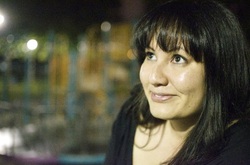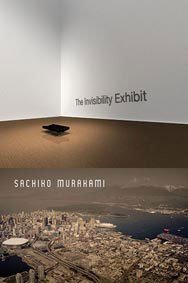 Sachiko Murakami Sachiko Murakami is the author of the poetry collections The Invisibility Exhibit (Talonbooks, 2008), a finalist for the Governor General’s Literary Award and the Gerald Lampert Memorial Award, and Rebuild (Talonbooks, 2011). She has been a literary worker for numerous presses, journals, and organizations, and is Poetry Editor for Insomniac Press. She is the initiator of the online collaborative poetry projects Project Rebuild and PowellStreetHenko.ca. She lives in Toronto. RUSTY TALK WITH SACHIKO MURAKAMI Kathryn Mockler: What is your first memory of writing creatively? Sachiko Murakami: I would write fake diary entries about what me and my friends did after school. I would write these after school alone in my room (often hiding behind a piece of furniture), as I had no friends. KM: Why did you become a poet? SM: Um. See: friendless and hiding behind furniture, above. Clearly I was not going to be a professional soccer player. KM: Could you describe your writing process? (For example, do you write every day? When? Where? How do you approach revision, etc.) SM: Step 1: Find something that hooks a thought into a line. Most often I find this happens while walking in an unfamiliar neighbourhood, reading a poem, waking in the middle of the night, etc. Step 2: Scribble line down (usually on a smudgy receipt, as I am rather bad at keeping notebooks on hand). Step 3: Bring line to page. Step 4: Keep going. Step 5: Revision is an evolutionary process. I wrestle around with the poem for a while, take a break, return, repeat. Then I bring the poem to someone else and watch as they politely break its beautiful legs. Then I begin again. KM: Rejection or criticism can often stop writers before they start. Do you have any advice on how to deal with rejection? SM: Stay open! Prepare yourself for the gifts criticism and rejection are going to give you: resilience, yes, but also a curiosity about your work, and better writing. Invite in editors who will politely break your poem's limbs (the key word being politely). Take a workshop. Start a writing group. Get used to criticism, and use criticism. Listen to the questions that are being asked of your poems. Take the serious questions seriously. Rejection from publishers and literary journals is, for the most part, a numbers game. When I read for literary magazines, there would be a hundred poems submitted for every one page available. If publication is your goal, then try your best to write publishable material. If writing is your goal, then keep writing. KM: You used to co-host the Pivot Readings at The Press Club in Toronto. Do you have any advice or tips for new writers about performing their work in front of audience? SM: Don't: pre-explain your poems, get drunk beforehand, or go over your allotted time. Do: Talk to your audience. Look at them. Invite them in to your poems. Go under time. Then thank your hosts and the bar. KM: From your perspectives as an editor and poet, how would you describe the writer/editor relationship? What should a new writer expect once his or her manuscript is accepted by a publisher? SM: See above re: breaking of limbs, asking serious questions. As an editor, I think I develop a stronger relationship with the manuscript than with the writer. In terms of the publishing process, a first-book author can expect to develop the quality of patience. A manuscript passes through many busy hands before it becomes a book. KM: Can you tell us about your collaborative poetry projects? What got you interested in collaborative poetry? What has the response been? SM: ProjectRebuild.ca began when I invited some poets into a poem about a Vancouver Special (a type of house in Vancouver). I was interested in seeing how they would interpret my invitation to renovate it as they saw fit. I then had a friend, Starkaður Barkarson, create a website in which any of the poems can be "moved into" and "renovated". There has been a tremendous response to this project—over 200 poems on the site from contributors across the world. The source poem, "Vancouver Special", resides in my second collection, Rebuild. PowellStreetHenko.ca is an online renga commissioned by the 2012 Powell Street Festival. A renga is a collaborative Japanese form in which each stanza is written by a new person. This renga expands outwards, as you can respond to every stanza in the poem (not just the last one written, as in a traditional renga). Powell Street Festival is a Japanese-Canadian festival held in Vancouver. They asked me to create something like Project Rebuild for them, and this is what I came up with (along with Starkaður). I travelled to Vancouver this summer to launch the project at the festival, and since then the poem has slowly grown as people reflect on change ("henko"), the theme of the poem. Why do this? I like the idea of putting writing out there that can be taken and messed around with and misinterpreted and reused and repurposed. I like the discomfort it brings. I like prying my writing from my ego's fist. I like conversations. KM: What is your funniest or favourite literary moment that you've experienced. SM: Jacob McArthur Mooney leaving the stage during his reading at Pivot to buy the audience cotton candy from the street vendor passing by on Dundas. No wonder he's the new host. KM: What are you working on now? SM: Poems about airports/the struggle to stay present. A novel about fake orphans. SACHIKO MURAKAMI'S RECENT WORKS  Rebuild, Talonbooks, 2011 Description from the publisher: In a city ironically famous for its natural setting, the roving subject’s gaze naturally turns upward, past the condo towers which frame the protected “view corridors” at the heart of Vancouver’s municipally- guaranteed development plan. But look for the city, and one encounters “a kind of standing wave of historical vertigo, where nothing ever stops or grounds one’s feet in free-fall.” Murakami approaches the urban centre through its inhabitants’ greatest passion: real estate, where the drive to own is coupled with the practice of tearing down and rebuilding. Like Dubai, where the marina looks remarkably like False Creek, Vancouver has become as much a city of cranes and excavation sites as it is of ocean and landscape. Rebuild engraves itself on the absence at the city’s centre, with its vacant civic square and its bulldozed public spaces. The poems crumble in the time it takes to turn the page, words flaking from the line like the rain-damaged stucco of a leaky condominium. The city’s “native” residential housing style now troubles the eye with its plainness, its flaunting of restraint, its ubiquity. What does it mean to inhabit and yet despise the “Vancouver Special”; to attempt to build poems in its style, when a lyric is supposed to be preciously unique, but similar, in its stanzas or “rooms,” to other lyric poems? What does it mean to wake from a dream in which one buys a presale in a condo development—and is disappointed to have awoken? In the book’s final section, the poems turn inward, to the legacy left by Murakami’s father, who carried to his death the burden of the displaced and disinherited: the house seized by the government during WWII, having previously seized the land from its native inhabitants—a “mortgage” from which his family has never truly recovered.  The Invisibility Exhibit, Talonbooks, 2008 Description from the publisher: These poems were written in the political and emotional wake of the “Missing Women” of Vancouver’s Downtown Eastside. Although women had been going missing from the neighbourhood since the late 1970s, police efforts were not coordinated into a full-scale investigation until the issue was given widespread public visibility by Lori Culbert, Lindsay Kines and Kim Bolan’s 2001 “Missing Women” series in the Vancouver Sun. This media coverage, combined with the efforts of activists in political and cultural sectors, finally resulted in increased official investigative efforts, which have so far led to the arrest of Robert Pickton, on whose property the remains of twenty-seven of the sixty-eight listed women were found. In December 2007, Pickton was convicted of six counts of second-degree murder in what had become one the highest-profile criminal cases to take place in B.C.’s history; yet this is not the focus of this book. As the title suggests, the concern of this project is an investigation of the troubled relationship between this specific marginalized neighbourhood, its “invisible” populations both past and present, and the wealthy, healthy city that surrounds it. These poems interrogate the comfortable distance from which the public consumes the sensationalist news story by turning their focus toward the normative audience, the equally invisible public. In the speaker’s examination of this subject, assumptions and delineations of community, identity and ultimately citizenship are called into question. Projects such as Lincoln Clarkes’ controversial Heroines photographic series and subsequent book (Vancouver: Anvil Press, 2002), news stories, and even the 2010 Vancouver Olympic Winter Games circulate intertextually in this manuscript, while Pickton’s trial is intentionally absent. Irritated by complacency, troubled by determinate narrative and the relationship between struggle and the artistic representation of struggle, Murakami is a poet bewildered by her city’s indifference to the neglect of its inhabitants. |
Rusty Talk
Rusty Talk Editor: Archives
November 2017
Categories
All
|

 RSS Feed
RSS Feed
